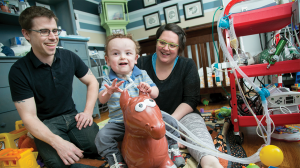Against All Odds
Baby Collier Proves He's a Survivor
His brown eyes impish, Collier Hart sits smiling in his crib repeatedly saying, “Wa wa.” Given a sippy cup of water, he throws back his head and drains it. Next, he puts his hands together, fingertips touching, and makes the sign for “more.”
The scene would be nothing extraordinary for most 2-year-olds, but it is miraculous for Collier, a child who spent the first 15 months of his life at Duke Children’s after he was born with severely underdeveloped lungs.
“Here’s a kid, all the odds were against him,” says William Malcolm, MD, medical director of Dukes’ Special Infant Care Clinic, as he blinks away tears. “He’s thriving, and the reasons he’s thriving are his parents, the amount of services we were able to provide here at Duke, and obviously, Collier himself. You get emotional about outcomes like this.”
Surrounded by Love, Ready to Fight
Before Collier was born, tests at Duke Children’s showed the baby’s lungs were compromised, and when Natalie Hart went into premature labor, the neonatology team was ready.
On July 3, 2014, Collier arrived at 32 weeks weighing 4 pounds, 3 ounces — and crying. No one had expected him to be able to cry. Natalie and husband Eric Hart were ecstatic even as their new baby was whisked away to be intubated.
Collier had pulmonary hypoplasia, or a severe underdevelopment of the lungs. “They were stiff and couldn’t expand, even with us giving him surfactant and putting him on a ventilator,” Malcolm says. “His heart had to pump extra hard to put blood in there to be oxygenated, so he developed pulmonary hypertension.”
After more than six months, Collier was not improving. He remained on the ventilator, had a feeding tube, and was on painkillers and sedatives.
“Painkillers and more painkillers, just this whole cocktail of different medicines he was on,” says Natalie. “Doctors were talking about him possibly having infant delirium. He was out of it, shaking his head a lot. His condition just wasn’t getting better.”
Many times, Malcolm says, doctors weren’t sure Collier would survive.
“We wondered, first of all, was it the right thing to continue to push on with the medications we had for his lungs and for his heart,” Malcolm says. “That’s always a question, an ethical question, if we keep pushing, what will his outcome be? And the second question is, will he respond?”
The Harts made the wrenching decision to sign a Do Not Resuscitate order for their boy because the dangers of CPR were just too great. They asked how much time Collier might have left. Maybe weeks, they were told. Family members arrived from out of town to spend time with the baby. They conducted a baptism.
But then, as Eric describes it, the doctors at Duke had a few more tricks up their sleeves.



